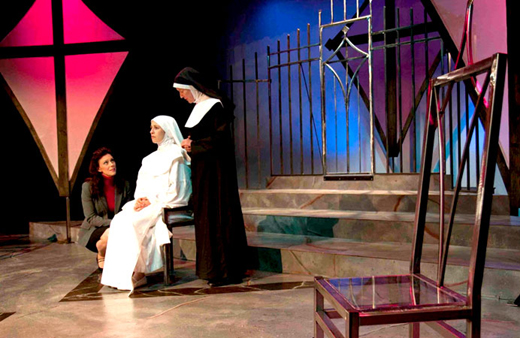Why are we afraid of Agnes of God?
Why are we afraid of Agnes of God?
www.mangaloretoday.com
By Flavia Agnes
Mumbai, October, 10, 2015: Rarely do I move away from my avowed field of expertise in this column, i.e. concerns of women within the legal domain or examining the inherent bias within laws and procedures. However, the recent controversy over a play, Agnes of God, raised by certain individuals claiming to represent the Catholic community, constrains me to claim my right to speak as a citizen, a member of the community and as someone who has been actively involved in reforming the Christian divorce laws a decade or two ago, rendering divorce more accessible to Christians.

What is rather disturbing is that the Roman Catholic religious leadership has bitten the bait. Cardinal Baselios Cleemis, president of the Catholic Bishops’ Conference of India (CBCI), has, in a letter to the home minister, demanded a ban on the ground that the play hurts the religious sentiments of Christians because, he writes, it “misinterprets the religious belief of the Christian Community and wrongly portrays character of thousands of the clergy who are committed to a life of celibacy”.
This letter followed the press statement released by Archdiocese of Bombay on September 29, claiming that the promotional advertisements of the play distort Catholic religious concepts as they portray Catholic nuns as “characters lacking in integrity and guilty of cover-up of infanticide” and that “such a depiction… unfair to our religious sisters who are working selflessly with dedication and generosity… will lower the esteem for nuns in the eyes of children to whom nuns impart knowledge and human values”. Agnes of God, directed by Kaizaad Kotwal, is based on the original play by John Pielmeier which, the writer claimed, was based on a true story. It was performed in the US in 1979 and adapted into a film of the same name in 1985, starring Jane Fonda. It won several Academy Award nominations.
Agnes of God, directed by Kaizaad Kotwal, is based on the original play by John Pielmeier which, the writer claimed, was based on a true story. It was performed in the US in 1979 and adapted into a film of the same name in 1985, starring Jane Fonda. It won several Academy Award nominations.
The play is styled as a murder mystery around the death of a newborn. The child’s mother, a young nun, explains her pregnancy as “immaculate conception” and claims not to know how the child was strangled to death at birth with the umbilical cord. The other nuns in the convent, including the mother superior, feign ignorance and project her as insane to save her from murder charges.
Since the controversy arose, the director has alleged that he has received threats of arrest, imprisonment and harm to body and property, but that he won’t “give in”. The first performance of the play, scheduled for September 4, 2015, had to be cancelled because of protests, but the play was performed on Monday evening at Mumbai’s National Centre for Performing Arts (NCPA). The performance was filmed by authorities to check for any objectionable content.
One strong voice that has emerged against the demand for a ban on the play is of Fr. Jacob Peenikaparambil, Carmelites of Mary Immaculate (CMI), who, in an open letter to Cardinal Cleemis, asked, “Is our faith so weak that a book or play can destroy it?”
While questioning why the Church is spending its energy on a non-issue when several crucial issues facing the minority community in India remain unaddressed, he said that “a film or a play could be a criticism of an existing evil and the intent of the author or producer could be to dissuade people from committing evil”.
Fr. Jacob Peenikaparambil, commenting on the recent beef murder case, said that the Church should, instead, take the initiative to bring together all secular forces committed to the protection of human rights and approach the National Human Rights Commission against increasing attacks on minorities in the country.
Catholics are a beef eating community and it’s precisely for this reason that the Bharatiya Janata Party-ruled state of Goa has not introduced a beef ban though it’s been enforced in the neighbouring Maharashtra. But, there have been instances of Catholic women being harassed and detained at check points while travelling from Goa to Mumbai on the suspicion of carrying beef. The Church in Mumbai has never raised concerns regarding this. The only Catholic voice of protest one heard was that of Julio Rebeiro, the former DIG of Punjab, who opposed the ban as a beef eating Christian.
Several Roman Catholic women leaders have opposed the demand for a ban on the play and questioned the authority of Joseph Dias, secretary, Christian Secular Forum, to speak for the entire community.
This is not the first time Mr Dias has demanded a ban. In August 2012, he had demanded a ban on the Bollywood film Kyaa Super Kool Hain Hum. Some feel that such demands tarnish the image of the entire community, as their motive is often nothing more than seeking publicity.
Ban on books, films, plays and artistic works on the pretext of “hurting religious sentiments” of a particular community have become a fad and the Church should restrain from subscribing to this trend.
Virginia Saldanha, secretary, Indian Christian Women’s Movement, has said the issues raised in the play are relevant to Christian women in India and that by demanding a ban, the Church has invited attention to the issue that has been simmering for a long time.
Though by and large women are reluctant to raise the issue of sexual harassment, a few incidents that were brought to light were investigated and the accused had been held guilty. But these are seldom discussed in public forums either within the Church or outside.
With the aim of bringing remedial measures, several Catholic women’s associations had come together in 2012, to draft a policy on sexual harassment of women within the Church and after labouring over several preliminary attempts, had submitted a well-formulated draft to the CBCI in 2013 for approval. But the religious leadership of Catholics in India has been dragging its feet over it.
Bishop Agnello Gracias, a prominent Church leader in Mumbai, has been an ardent supporter of these efforts. Cardinal Oswald Gracias, who heads the Archdiocese of Bombay, had assured that he would do his best to ensure that the policy is implemented. Despite these assurances, there has not been much progress.
Of course these issue concerns women across communities, and is not a unique malaise afflicting the Roman Catholic Church in India. Precisely because such cases have been creeping out of the woodworks in all religious communities, it is time we found ways of curbing the unbridled power of male religious leadership upon gullible women devotees, disciples and handmaidens. And this could begin with the Church adopting a strong policy against sexual harassment of women, rather than sweeping the issue under the carpet.
The writer is a Mangalorean, legal scholar, author, women’s rights activist and lawyer practicing in Mumbai.
- Need For ‘Students, Alcohol and Drugs’ survey
- New Synthetic Drugs Trapping Youth
- Mood Modifying Chips - Future of Drug Use
- Ramping up Indo-Bangla border security
- IITM- A premier educational Institution in a forest. What can we learn?
- Former PM, Manmohan Singh: Notable laws passed under his tenure
- Hashish on Ratnagiri Seashore
- The Poor cry out to Us: Do we respond?
- Clandestine Meth Labs Sprouting Across India
- Hydro ganja from Bangkok latest craze among youth in India
- "Memories to Treasure" Dr.Michael Lobo’s new book
- Dominance of Private Universities: Will it make education inaccessible to underprivileged students?
- Monti Phest: A rich heritage of South Canara
- Kashmir Bhavan in Bengaluru: A must visit place
- "MAI and I" Book of Angelic Emotions
- Draupadi Murmu - The New ’President of India’
- Anthony Ashram in the city grows a classic museum
- First College of Fisheries in India - A Golden Jubilarian
- Flushing Meadows - A Vintage Mansion
- The Colonel�s Bequest
- A Mangalorean PM and his RBI Governor Brother: The Extraordinary story of the Benegal Brothers
- There is no higher religion than Truth: Theosophical Society
- L�affaire - Ashu & Yiju of Mangalore
- Mangalore in Kowloon
- 1568 to 2018 AD: 450 years of Christianity in Mangaluru
- Vice President elect Naidu moves on from nadir to zenith, the phenomenal journey
- Embracing the Outdoors: How Heated Jackets Are Revolutionizing Cold Weather Activities
- Efficient and Sustainable Packaging Solutions with FIBCs
- The Hybrid Kilt Revolution | Where Tradition Gets Trendy
- Affordable Elegance | Embrace Style on a Budget with Cheap Kilts
- Unleashing Style and Functionality | Exploring Tactical Kilts
- Mangalore’s Heroic Lady marks 105th Birthday
- Santa the Christmas spirit
- Geriatric care: Mangalore strikes a fine balance
- The Don Who Made Two Empires to Clash
- CHITRAPUR SARASWATS - A Great Kanara Community
- Our new President Ram Nath Kovind’s significant journey to Rashtrapathi Bhavan
- Marriages made in heaven, big fat weddings made in India
- Eid insight - The giver of glad tidings
- CITY INFORMATION
- TRAVEL
- TOURIST INFORMATION
- HEALTH CARE
- MISCELLANEOUS




 Write Comment
Write Comment E-Mail To a Friend
E-Mail To a Friend Facebook
Facebook Twitter
Twitter  Print
Print 


